As the heat and smoke created by the Hema Committee report is yet to subside, a new organisation in the Malayalam film industry has been announced. Temporarily named the “Progressive Malayalam Film Makers Association,” it aims to provide a platform with equal stakes for everyone in the industry—from producers to daily wage workers who put up cinema posters. “It will be an inclusive and democratic platform. People from all walks of cinema will have a voice in this association,” says Ashiq Abu, a filmmaker who has openly voiced his dissent against powerful bodies in Malayalam cinema like AMMA (Association of Malayalam Movie Artists) and FEFKA (Film Employees Federation of Kerala). Filmmakers such as Ashiq Abu, Rajeev Ravi, Kamal, and sound recordist Ajayan Adat are leading the effort to establish this organisation. “We have started the process of formulating the basic principles and bylaws of the organisation. One thing is for certain: the primary objective of the association is to address concerns of safety and exploitation,” says Ashiq Abu.
A New Malayalam Film Industry Body Aims To Address Existing Problems
Temporarily named the 'Progressive Malayalam Film Makers Association', it aims to provide a platform with equal stakes for everyone in the industry—from producers to daily wage workers who put up cinema posters
Active WCC members Rima Kallingal is also part of this new venture. The names in leadership roles of the new organisation suggest its character. Ashiq Abu and Rajeev Ravi are prominent filmmakers who have worked to move Malayalam cinema away from locations and stories that focused on upper castes. Ashiq's “Virus,” a 2019 medical thriller based on Kerala’s tryst with the Nipah outbreak, has been widely acclaimed. Rajeev Ravi, a cinematographer and filmmaker popular in Bollywood for his collaborations with Anurag Kashyap, has a collection of films that have garnered national and international awards. Kamal K.M., known for his debut Hindi feature film “ID,” is also at the forefront of this new collective. His 2022 Malayalam film “Pada,” based on a true story from 1996, depicts a hostage situation involving the Palakkad District Collector and a Naxal group, the Ayyankali Pada, which demanded the repeal of the amendment to the Kerala Scheduled Tribes (Restriction on Transfer of Lands and Restoration of Alienated Lands) Act, 1975. This amendment legalised the transfer of Adivasi land between 1960 and 1984. Though the Ayyankali Pada kept Kerala on edge for an entire day by taking the law into their own hands, they garnered widespread sympathy for their cause. Kamal's film was also widely appreciated for its quality.
The Hema Committee report has effectively paralysed existing organisations like AMMA and FEFKA, both led by powerful figures in the industry. AMMA disbanded its entire Executive Committee, refusing to respond to the Hema Committee's findings. FEFKA remained silent for days and weeks. Eventually, B. Unnikrishnan, a key founder, broke this silence in a press conference, asserting the organisation’s stance against exploitation and sexual harassment. However, he denied allegations that WCC members had faced bans since the formation of the organisation.
Ashiq Abu, who publicly criticised FEFKA, announced his resignation after raising a series of allegations against its leadership. He claimed that FEFKA demands money even to address workers' issues. A few years ago, he filed a complaint against a producer with overdue payments, only to have FEFKA demand 20 per cent of the owed amount as a commission for their intervention. He also alleged that FEFKA has failed to adequately respond to the Hema Committee's findings.
Even before the official formation of the new collective, the label of being “left-liberal” has been imposed on them due to the political views of the filmmakers behind it. However, the organisation anticipates impending challenges. “We all know it will be very challenging to run an organisation with people from different classes, such as producers and poster workers on the street. However, our primary concern is to ensure safety for workers, especially women. Other fundamental labour issues raised in the Hema Committee report, such as toilet facilities for workers and underpayment, are also at the top of our priority list,” says Ashiq Abu in a conversation with Outlook.

